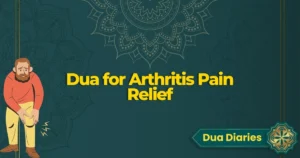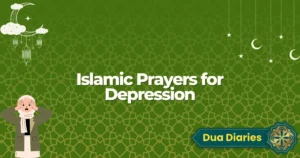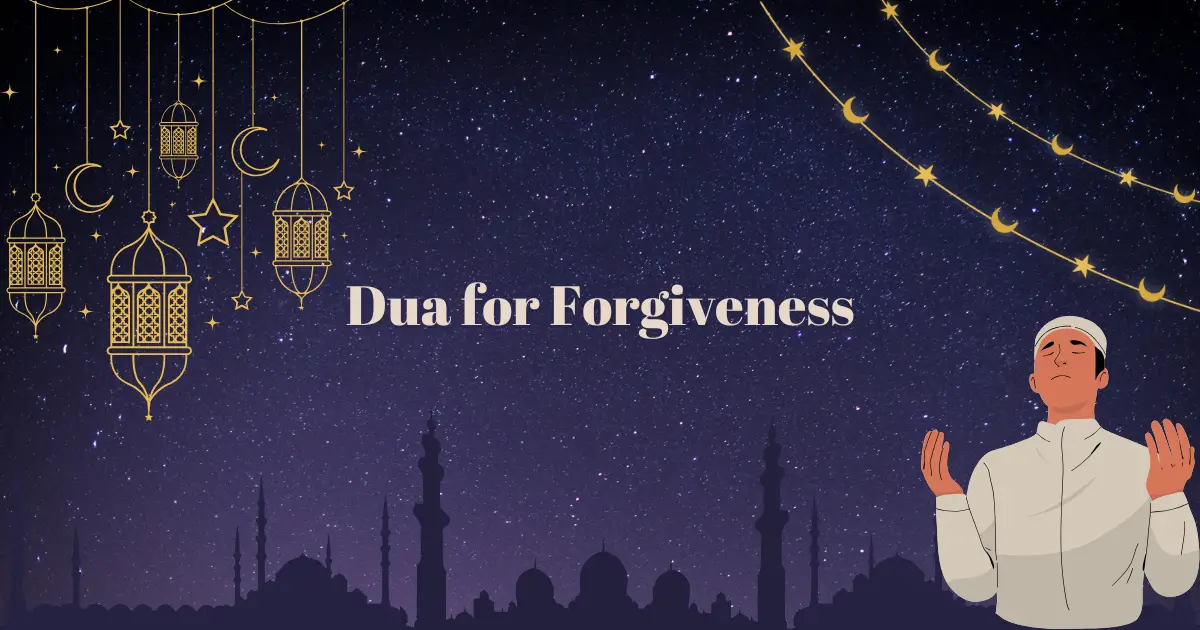
Dua for Forgiveness: Embracing Allah’s Infinite Mercy
رہنمائی فہرست Guidance Index
Seeking forgiveness from Allah (SWT) is a cornerstone of Islamic faith. Regardless of how many times we stumble or how grave our sins may be, Allah’s mercy is boundless. In Islam, turning to Allah in repentance—known as tauba—is not just a recommended practice, but an essential part of our spiritual journey. This article explores the dua for forgiveness, its significance, and how you can make sincere tauba to purify your soul and draw closer to Allah.
The Importance of Seeking Forgiveness in Islam
Allah’s Endless Compassion
Allah (SWT) describes Himself as Ar-Rahman (The Most Compassionate) and Ar-Raheem (The Most Merciful). The Quran repeatedly reminds us that we should never despair of Allah’s mercy, no matter how many sins we’ve committed:
“Say, ‘O My servants who have transgressed against themselves [by sinning], do not despair of the mercy of Allah. Indeed, Allah forgives all sins.’”
(Quran 39:53)
A Lifeline for Believers
Seeking forgiveness, or tauba:
- Cleanses the heart of spiritual burdens
- Strengthens our bond with Allah
- Encourages moral improvement and piety
The Prophet Muhammad (PBUH) taught that all human beings commit sins, but the best among them are those who continually repent and seek Allah’s forgiveness.
Sincere Dua for Forgiveness: Purify Your Soul
One of the most powerful ways to seek Allah’s mercy is through dua for forgiveness. By humbly turning to Allah with our mistakes and shortcomings, we acknowledge our dependence on Him. This act of humility purifies the soul and fosters a deeper connection with our Creator.
Quran and Hadith Emphasis
Both the Quran and the Hadith underscore the necessity and virtue of regularly saying phrases like “Astaghfirullah” (I seek forgiveness from Allah) and other supplications that express remorse for sins. The Prophet (PBUH) himself used to seek forgiveness from Allah numerous times a day—teaching us that no one is beyond the need for tauba.
The Complete Dua for Forgiveness (Sayyidul Istighfar)
Among the various Islamic duas for forgiveness, one of the most renowned is the Sayyidul Istighfar (the Master of Supplications for forgiveness). Reciting it sincerely has immense virtues:
Arabic Text
اللَّهُمَّ أَنْتَ رَبِّي، لَا إِلَهَ إِلَّا أَنْتَ، خَلَقْتَنِي وَأَنَا عَبْدُكَ،
وَأَنَا عَلَى عَهْدِكَ وَوَعْدِكَ مَا اسْتَطَعْتُ،
أَعُوذُ بِكَ مِنْ شَرِّ مَا صَنَعْتُ،
أَبُوءُ لَكَ بِنِعْمَتِكَ عَلَيَّ،
وَأَبُوءُ بِذَنْبِي،
فَاغْفِرْ لِي فَإِنَّهُ لَا يَغْفِرُ الذُّنُوبَ إِلَّا أَنْتَ
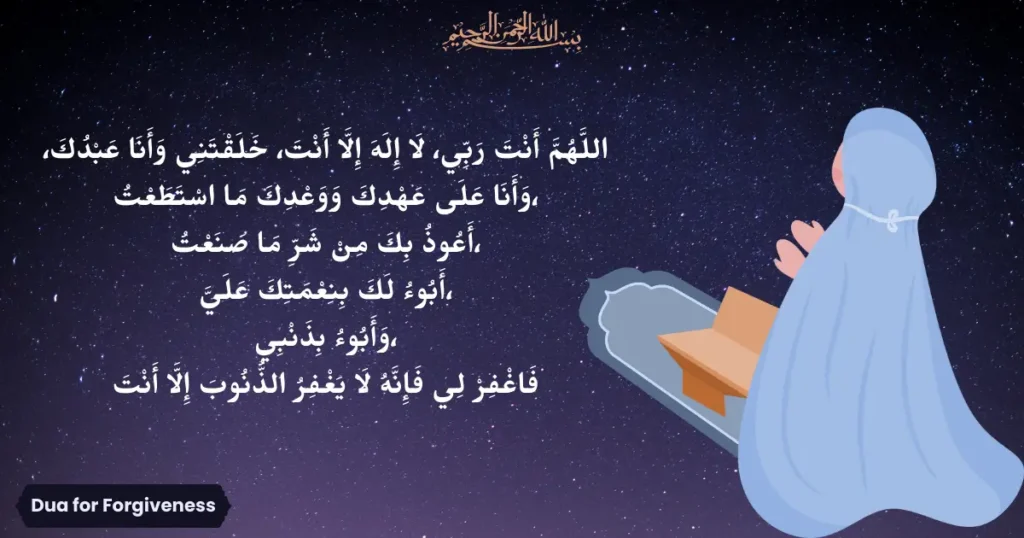
Transliteration
Allahumma anta Rabbi, la ilaha illa Anta, khalaqtani wa ana ‘abduka,
wa ana ‘ala ‘ahdika wa wa’dika mastata’tu,
a’udhu bika min sharri ma sana’tu,
aboo’u laka bini’matika ‘alayya,
wa aboo’u bithanbi,
faghfir lee fa innahu la yaghfirudh-dhunooba illa Anta.
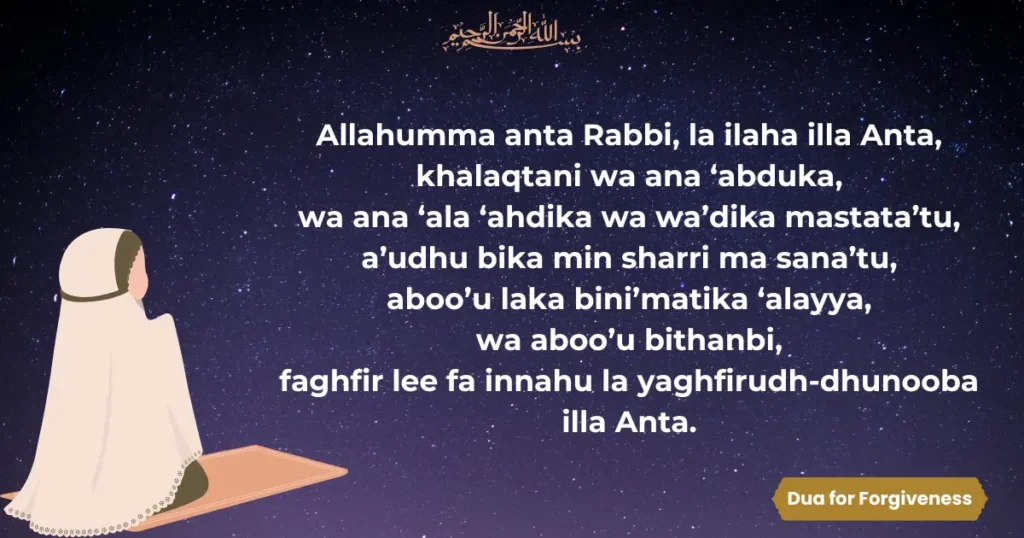
Translation
“O Allah, You are my Lord. There is none worthy of worship but You. You created me and I am Your servant. I uphold Your covenant and promise to the best of my ability. I seek refuge in You from the evil I have done. I acknowledge before You all the favors You have bestowed upon me, and I confess my sins to You. So forgive me, for surely none can forgive sins except You.”
Explanation of Its Meaning
- Recognition of Allah’s Lordship: We affirm that Allah alone is worthy of worship and the source of our existence.
- A Pledge to Allah: We commit to obeying His commands to the best of our ability.
- Seeking Refuge from Our Wrongdoings: We admit our sins and beg for Allah’s protection from their consequences.
- Gratitude for Blessings: We remember and express gratitude for all the favors He has given us.
- Confession and Forgiveness: We conclude by acknowledging that Allah alone can forgive our shortcomings.
Additional Quranic Verses and Duas for Seeking Allah’s Mercy
Below are some more supplications and Quranic verses often recited as part of tauba ki dua and dua for repentance:
- Astaghfirullah
- Meaning: “I seek forgiveness from Allah.”
- A short yet powerful phrase that can be recited at any time to invite Allah’s pardon and barakah (blessings) into your life.
- Rabbi ighfir li wa tub ‘alayya innaka Anta at-Tawwabu ar-Raheem
- Meaning: “My Lord, forgive me and accept my repentance. Indeed, You are the Acceptor of Repentance, the Most Merciful.”
- A heartfelt plea acknowledging Allah’s names and attributes of mercy and forgiveness.
- Surah Al-Fath (48:29): “He it is Who has sent His Messenger with guidance and the religion of truth…”
- While not specifically a dua, reflecting on Quranic verses about Allah’s guidance and forgiveness can deepen your state of tauba.
How to Make a Sincere Tauba: Step-by-Step Guide
Making tauba involves more than just reciting a dua; it requires genuine remorse and commitment. Scholars commonly outline the conditions for sincere repentance as follows:
- Feel Remorse for the Sin
- Truly regret having disobeyed Allah and acknowledge the harm caused to your spiritual well-being.
- Stop the Sin Immediately
- Discontinue any sinful activity or behavior you are engaged in.
- Resolve Not to Return to It
- Make a firm intention never to commit the sin again.
- If you slip, do not lose hope—turn back to Allah in repentance.
- Return Rights (If Applicable)
- If your wrongdoing involves the rights of another person (e.g., theft, slander), rectify it by returning what you took or seeking their forgiveness.
- Make a Sincere Dua for Forgiveness
- End your repentance process by humbly asking Allah to forgive you. Recite any Islamic dua for forgiveness, such as Sayyidul Istighfar or Astaghfirullah.
Benefits of Seeking Forgiveness Regularly
Consistently making dua for forgiveness and practicing tauba has multiple spiritual and worldly benefits:
- Peace of Mind: Freeing your conscience from guilt brings immense tranquility and emotional well-being.
- Increased Blessings: Allah promises to open the doors of rizq (sustenance) and barakah for those who remember Him and seek His forgiveness.
- Protection from Punishment: Regular repentance can shield you from trials and tribulations in this life and the hereafter.
- Strengthened Relationship with Allah: A heart that constantly seeks Allah’s mercy remains spiritually vibrant and close to the Creator.
Humility and Sincerity: Key Elements of Tauba
One cannot overstate the importance of humility and sincerity when asking for forgiveness. True repentance goes beyond lip service—it involves a heartfelt conviction and a deep sense of regret for one’s wrongdoings. Recognizing our dependence on Allah’s mercy keeps us grounded and reminds us that self-righteousness has no place in Islam.
Conclusion: Making Dua for Forgiveness Part of Your Daily Routine
In summary, dua for forgiveness—whether it’s Sayyidul Istighfar, Astaghfirullah, or any other Islamic dua for forgiveness—is a powerful means of drawing closer to Allah. By regularly engaging in tauba, we acknowledge our shortcomings and rely on Allah’s boundless compassion. Make it a habit to incorporate dua for repentance into your daily life:
- Recite Astaghfirullah whenever you feel a lapse in your actions or thoughts.
- Set aside time in the morning or evening for Sayyidul Istighfar.
- Continuously strive to improve your character and remain steadfast on the righteous path.
Remember, Allah loves those who turn to Him in repentance, and He never tires of forgiving as long as we remain sincere. May He bless us all with His infinite mercy, guide us on the straight path, and grant us the strength to overcome our weaknesses. Ameen.


